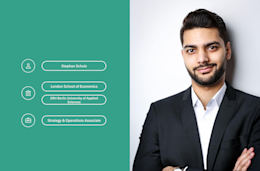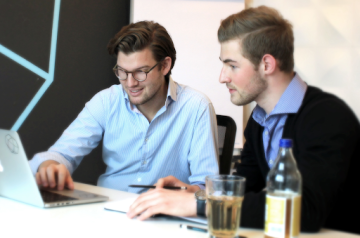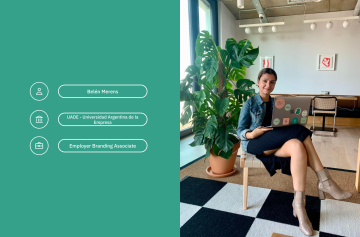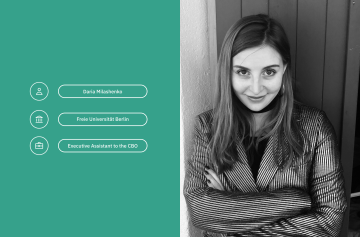
Strategy and Ops Associate Stephan Schulz on how his university studies impacted his life
Team Spotlight: Our DACH Strategy and Operations Associate tells us about the university courses that shaped him most and explains why it’s so important to build relationships and stay curious.
8 min read
Stephan Schulz once dreamed of working with robots or becoming a sound engineer. But his mother noticed his knack for numbers and started referring to him as the finance minister of the family. Why? Well, it all started when Stephan lent some of his hard-earned money to a certain family member. “I used to do extra chores for pocket money, so it was really a hustle for me to get cash,” he recalls. “My dad would sometimes borrow money to buy ice cream and I would tell him he needed to pay it back right away. But my father wasn’t always good at paying off his debts—so I announced that I was considering charging interest because it was taking so long!”Stephan harnessed his love of numbers and combined it with business and psychology, earning a Bachelor’s degree at SRH—the Berlin University of Applied Sciences—in Business Psychology. Following that, he earned a Master’s at the London School of Economics and Political Science in Science, Organizational, and Social Psychology. Now, Stephan works in Strategy and Operations at N26 for the German, Austrian, and Swiss markets. We sat down to talk about his career path and how his studies impacted him. Our interview has been edited and condensed for clarity.Tell us a little about yourself—including where you’re from and what your role is at N26.I work in the growth department at N26—in the DACH department, specifically—doing Strategy and Operations. I’ve been in this position for over two years and with N26 for over two and a half years. I was born and partially raised in Freilassing in Bavaria, though because of my dad’s work I traveled to Ethiopia for a while and then spent a year in Saudi Arabia. I came back to Germany and did my Abitur (A levels) in Bavaria and before moving to Berlin for college.Where did you go to undergrad and what did you study?I’d done a lot of business topics in my Abitur, so it was clear to me that I was going to do something business-related at university. But I wanted to focus on marketing, which is how I found the program at SRH, a small private university in Berlin. The university is part of the healthcare conglomerate—also called SRH, with campuses in several cities in Germany. It was founded after World War II in order to reintroduce those returning from war to working life. I studied Business Administration and Business Psychology, which is also what I did for my Master’s degree, with a focus on organizational behavior and behavioral economics. College is a formative time for many of us. Can you tell us about your experience there? Are there specific stories, events, or relationships that stuck with you?What I really appreciated about SRH was that you weren’t thrown into these big lectures with 800 people. It was about 30 people per class, which made it more intimate and meant we were able to easily engage with others and really get to know everybody in class. That was super valuable—it allowed me to get in contact with people that I would come to call friends. It’s why many of the people I went to university with in Berlin are people I still hang out with. You did your Master’s at the London School of Economics. Can you talk a little bit about your experience there? The LSE is very well known, which can be kind of intimidating. Suddenly, you’re no longer the smartest person in the room—you’re just one of many. But the level of conversation was amazing. Everyone was very driven, informed, and engaged—I had never experienced that kind of energy before. And the conversations would continue outside of class, which was something I found incredibly rewarding. After lectures, you would have discussions, meet in the pub and have a drink, and still talk about what you’d learned during the day—continuously reflecting on the topics you studied. What university class taught you the most, and how has it shaped the person you’ve become today—both professionally and personally?One of the key classes I had was in my fourth semester of undergrad, called “Politics and Economics.” I found this super interesting because it looked at politics and economics from a historical perspective, taking into account views of evolution and all these different philosophical ideas that influenced how societies work.The lectures were also super interesting at LSE. I remember one called “Psychology of Economic Life,” which was basically about behavioral economics. It looked at the work of different economists and philosophers, but from a psychological perspective. We looked at Keynes’ economic theory, for example, but focused on all the psychological ideas that shaped it. That was so novel to me.Talk a little bit about your career path after your studies and how you ended up at N26. Between my Bachelor’s and Master’s, I worked for a consulting company called KPMG. After I returned from London, I planned to continue with consulting. But while I was applying for jobs, a friend of mine who was at N26 suggested that I should apply, so I started out with an internship in the operations department, while still continuing my applications with consulting companies.Then, in March 2020, the consulting companies I was in conversation with froze the application process, due to the pandemic. But at that point, I had already realized that I didn’t want to leave N26. I transitioned to another role that allowed me to look at the same problems with a different lens, which I really enjoy. And in September of 2020, I joined full time, and I haven’t looked back since!What’s a typical day like in your role? With Strategy and Operations, you try to be on top of everything. We need to make sure Germany, Austria, and Switzerland are running smoothly and that there’s nothing interfering with business as usual. We also assess what opportunities we have, what the competition is like, what new customers want, general trends that we see in the markets, and so on. We also look for opportunities to improve, whether it’s to reduce costs or enhance the experience that customers have with the product. What that means concretely is that there’s a lot of data analysis that we need to do, which is where I’m able to leverage what I learned at university. Talk more about that! How do you apply the skills you learned in your degree to your current role, be they technical skills or soft skills like communication and teamwork?Statistics is one skill that I use all the time. Because we do so much data analysis, having a solid statistical foundation really comes in handy. Also, the fact that I am able to write R, which is a programming language for statistical analysis, is super valuable. These are the hard skills that I’m able to use on a daily basis. In terms of soft skills—I remember listening to a podcast once, and they were saying one of the things you learn at university is how to get along with other people and how to work with them. From working with others in a constructive way, being empathetic, or trying to understand how we can best leverage our skills, it’s all about how we can support each other in a way that’s going to be beneficial. Especially at N26, a company that nurtures close relationships between employees, you’ll always find a few people that you consider more friends than coworkers. This allows you to not only be strictly business, but to understand that these are actual human beings and not just human resources. And I think the groundwork of that for me was laid at university. Looking back, what lessons did you take from your time at college? Well, one of the traits that I’ve kept close to my heart and try to practice as much as possible is to be curious. Curiosity allows you not only to engage with a subject, it allows you to be empathetic. If you’re not curious, you’re not asking questions—you're not getting to know other people. Curiosity requires a certain level of openness and a willingness to be wrong.Do you have any tips for current students?Studying and getting good grades is important, but you have to find the right balance between that and enjoying yourself, getting to know people, and having memorable experiences. Personally, I probably spent a few too many hours focusing on my grades, rather than going out with people and making friends. At the end of the day, you can’t know everything, but if you have people around you who know the things you don’t, it’s easier to get stuff done. If you think about it, the people you meet at university will hopefully be with you for the rest of your life. Plus, these relationships can be the start of something great. I don’t know how many companies are being founded out of university, but from that perspective, uni seems to be a great space to start at. So, that’s my number one piece of advice: even if your grades aren’t the best, just enjoy the time that you have and make sure there’s a healthy trade-off between the two.
Find similar stories
BY N26Love your bank
Related Post
These might also interest youINSIDEN26Reflecting on 9 years at N26N26 Chief Growth Officer reflects on his 9-year journey at Europe’s leading digital bank
10 min read
INSIDEN26Employer Branding Associate Bel Merens on uni, travel, and living your dreamsTeam spotlight: Bel shares how she made her dream—moving to Europe to work for a popular FinTech—a reality.
9 min read
INSIDEN26Team spotlight: Daria Milashenko, Executive Assistant to the CBOWhen Daria Milashenko, Executive Assistant to the CBO at N26, visited Berlin at 15, it was love at first sight.
9 min read


